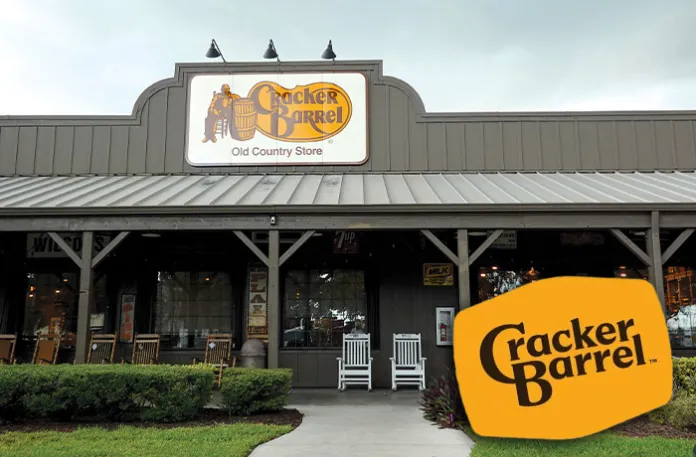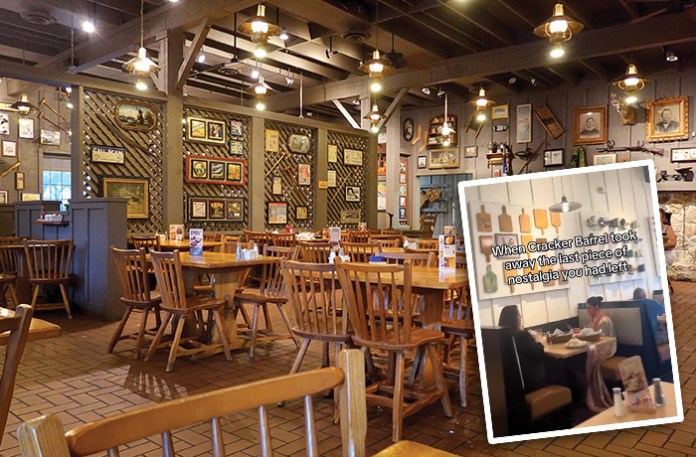I could fill a whole article with stories. The time a manager locked the front door at a sprint lest a tour bus swamp us a minute before closing. The time a young black co-worker startled everyone by refusing to “wait on [her] own kind.” The time I stole a sausage patty from a customer’s plate. Yes, Cracker Barrel was a memorable and sociologically fascinating place to work, as I did for a year in the early aughts. I am legitimately sorry to witness the company’s attempted suicide.
Cracker Barrel’s troubles started in May last year, when executives announced a “brand refresh” featuring “reimagined restaurant spaces.” Though the attendant press release promised to preserve the restaurants’ “authentic charm,” photographs of corporate-minimalist dining rooms soon went viral, horrifying fans who had grown up with the chain’s Southern-fried knickknacks and doodads. Gone, at least in the 25-30 “pilot” stores, were the vintage advertisements, mounted shotguns, and reproduction daguerreotypes that had created the Old Country Store vibe. In their place were mostly blank walls and eggshell hues. Imagine Mamaw embracing feng shui, and you’ll get the idea.
Had the publicly traded company quietly renounced its redecoration scheme, the backlash from its customers likely would have faded into history. Instead, the chain doubled down last month with the announcement of a new logo: a text-only eyesore replacing the familiar old-timer-with-barrel. Already hacked off by the renovation fiasco, the company’s longtime patrons pounced, accusing the corporation of betraying its history and values. Speaking for many, Fox News’s Mary Katharine Ham posted, “No one wants a minimalist Cracker Barrel. We want Hoarders: Southern Grandma Edition.” Even Gov. Gavin Newsom (D-CA) got in on the act, complaining that the new logo “looks like cheap Velveeta ‘cheese’ from Walmart.”

On the one hand, it is more than a little ridiculous that a mid-tier dining chain received more attention than, say, the war in Ukraine for a full week in August. On the other hand, the Cracker Barrel debacle touched so many live wires of American politics that the story was simply irresistible. If National Public Radio had begun distributing Bibles and handguns, well, people would have wanted to talk and write about that, too.
To begin with, the company’s unprovoked faceplant was, if nothing else, one of the biggest public relations misfires in recent corporate history. Cracker Barrel CEO Julie Felss Masino, the former president of Taco Bell and Mattel, came to the chain in November 2023, determined to enact a “strategic transformation” of the company. Convinced that “even iconic brands have to evolve,” the then-50-year-old proceeded to torch several decades’ worth of reputational capital while doing nothing to abate the corporation’s slide into ideological didacticism. (Cracker Barrel enacted a “Diversity and Inclusion Strategy” in 2021.) The result was both financially and legally disastrous. Plainly on the hunt for younger diners, Felss Masino succeeded mainly in alienating older ones. This past July, the conservative advocacy group America First Legal requested a federal investigation of the chain due to its alleged discrimination against white employees. Under the Trump administration, such an inquiry may well happen.
Though Cracker Barrel’s recent design changes were not exactly woke, it is next to impossible to understand the resultant uproar outside of that context. Uncle Herschel, the seated oldster in Cracker Barrel’s iconic logo, is not only a character from corporate lore, the founder’s real-life uncle, but a representative, even an aspirational, figure for a certain kind of American. In erasing him, the chain seemed brazenly to be erasing its customers, many of whom view the overall-clad farmer at rest as an archetype from America’s halcyon days.
Not helping matters was the fact that Cracker Barrel’s core customers belong to a newly restive political class, awake, as never before, to perceived slights. It is perhaps an oversimplification to say that Cracker Barrel is for people who are too well-off for truck-stop doughnuts and too poor for brunch at the Four Seasons, but there is nevertheless some truth to the formula. It will surely not have escaped the reader’s attention that this cohort was alternately ignored and despised by both political parties until the emergence of Donald Trump. Having learned to think of themselves as an identity group like any other, such Americans have begun to flex their muscles. Call it the Politics of White Grievance if you must, but don’t imagine for a moment that American cultural debates will henceforth proceed without taking these men and women into account.

Of course, other corporations have been down a similarly troubled road in recent years. This, too, helps explain why Cracker Barrel got burned so badly. In 2023, Bud Light famously teamed with the mentally ill crossdresser Dylan Mulvaney in an attempt to replace the brand’s “fratty … out-of-touch” customers with “young[er] drinkers.” Walmart had to be publicly shamed, late last year, into removing children’s “chest binders” and youth-oriented books about transgenderism from its shelves. Needless to say, progressive Democrats did not respond to those companies’ overtures by abandoning Trader Joe’s and prosecco to guzzle Buds at Wally World. Disaffecting one’s existing customers doesn’t lead to new shoppers. It leads to fewer.
At least among the populist-right intelligentsia, that economic truism can hardly be overstated as a final source of Cracker Barrel-related dismay. As the Tennessee-based company dismantled its history, a sense of here-we-go-again disappointment was compounded by an awareness, on social media, of the utter futility of it all. To paraphrase The Screwtape Letters, Cracker Barrel was selling its soul and getting nothing in return. This wasn’t just a mistake but a minor tragedy. Conservatives like Cracker Barrel. We want the restaurants to exist, to maintain their ethos, and to be worthy of our business. Indeed, it is not too much to say that an America without the 55-year-old chain, or with only a worthless and corrupted version of it, would be a little poorer.
Was the specter of Cracker Barrel’s collapse and bankruptcy a mere fancy? Perhaps so: The corporation has more than 650 locations and reported $3.47 billion in revenue in fiscal 2024. Nevertheless, the chain’s stock was already down more than 50% from its 2021 high when Felss Masino took the reins. It has since fallen still further. A megalith like the NFL can insult its fans from now until the end of time without taking a real hit. (See, for example, the league’s ridiculous “social justice” stenciling, still showing up in endzones near you.) Cracker Barrel’s position is more tentative, more precarious. As we have seen, one bad week can shake the entire edifice.
As has been widely reported, Cracker Barrel investor Sardar Biglari predicted this whole mess in 2024, calling Felss Masino’s rebranding scheme “obvious folly” in a letter to shareholders. What Biglari didn’t cite, but could have, is Robert Conquest’s famous Third Law of Politics, which invites observers to explain the behavior of “any bureaucratic organization” by “assuming that it is controlled by a secret cabal of its enemies.” The line is a joke, of course, at least in part, but that doesn’t make it any less perceptive. Cracker Barrel’s decision-makers may not actually be in the pay of IHOP or Waffle House. Nonetheless, they have undermined their own positions again and again. Incompetence, it turns out, is more evenly distributed among the income brackets than previously thought.
And so we come to the present and the corporation’s decision, as August wound down, to scrap its replacement logo and return to the iconic one. The company has also removed “DEI” and “Pride” pages from its website, a clear concession to the political and economic power of the MAGA Right. Talking all this over with a friend of mine, I received an earful about conservatives’ willingness to settle for scraps. Who cares about logos when so many corporate “antiracism” efforts continue apace? What good is bringing a company to heel when what that company offers is a soulless simulacrum of Americana?
I understand the sentiment. The nation will not be healed by restaurant signage, and social media wins count for almost nothing in the grand scheme of things. If the Cracker Barrel saga matters, it is only because everything now matters. Conservatives may resent the Left’s politicization of daily life, but we cannot reverse it. Our choices are to fight our corner or surrender. I, for one, am glad we’re doing some fighting.
As for Cracker Barrel, where the company goes from here is anyone’s guess. As a one-time employee, I can assure the reader that the tips aren’t great and that the chain will continue to depend on unskilled, largely apathetic workers for labor. Nor is it the case that the restaurants’ post-pandemic quality decline is simply in my and others’ heads. The irony is that Cracker Barrel really does need to change. What it requires, however, is travel back in time, not forward. As in so many other areas of American life, the standards of the past await rediscovery.
Will that happen? Probably not, given the company’s strange hesitance to part ways with its current leadership. If, by the time you read this, Felss Masino and her executive team have gone the way of fried chicken livers and red-eye gravy, things may improve rather quickly. If instead the corporation digs in, further empowering the unwitting wreckers and saboteurs — well, bless their hearts.
Graham Hillard is editor at the James G. Martin Center for Academic Renewal and a Washington Examiner magazine contributing writer.
